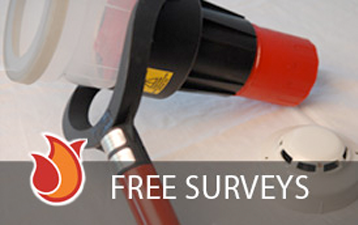Q: Why do I need a Fire Alarm System?
A: The “Fire Precautions (Workplace) Regulations” require that every employer carries out a Fire Risk Assessment which includes provision for “giving warning in case of fire”.
Q: Why can I not use the existing system we use for tea breaks/lunch etc?
A: BS5839: Part 1 2002. Recommends that “the fire alarm should be a different sound than anything else used in the building”.
Q: Why do I need to up-grade my fire alarm system?
A: In carrying out your statutory Fire Risk Assessment you must take into account advances in technology.
Q: Are the requirements of BS5839 legally binding?
A: No, BS5839 is a code of practice, which makes recommendations for the installation of a reliable fire alarm system. However, its’ recommendations are used as “requirements by controlling authorities and insurers”.
Q: Do I have to fully comply with everything in BS5839?
A: Whilst the recommendations should be generally followed, the code allows designers to make variations after carrying out a risk assessment and gaining agreement by all interested parties.
Q: Do I need automatic fire detectors?
A: This is a matter, which will be decided in your Fire Risk Assessment.
Q: Do I need to carry out a Fire Risk Assessment?
A: All employers must carry out a Fire Risk Assessment and, where there are more than 5 employees, it must be in the form of a written report.
Q: Do we need to carry out a Fire Risk Assessment if we have a Fire Certificate for our building?
A: The “Fire Certificate” was issued under the Fire Precautions Act 1971 and is no longer relevant. You should carryout a Fire Risk Assessment
Q: There appears to be several pieces of fire legislation relating to my building. Which do I have to comply with?
A: Yes you may have to comply with several pieces of legislation at this moment in time but the enactment on the “Fire Safety Order” later this year, will have the effect of repealing all other fire legislation. In the meantime it is essential that you carry out a Fire Risk Assessment under the Fire Precautions (Workplace) Regulations.
Q: Why do I need a service/maintenance contract for my system?
A: BS5839 recommends that all systems be subjected to periodic servicing in addition to routine testing. The Fire Precautions (Workplace) Regulations require a system of maintenance. Failure to keep the fire detection and alarms in good working order is a criminal offence.
Q: Who should test my fire alarm and how often should it be done?
A: The Responsible Person or users trained to operate the fire alarm should carry out a weekly test on a different manual call point each time, and a record kept in the fire alarm log book.
Q: At what intervals should the fire alarm system be serviced?
A: This should be decided by a risk assessment but in any case should be at least every 6 months. The service should be carried out to the latest British Standard, at present BS5839 pt1:2002, even though the system may have been installed to an earlier version.
Q: Who should carry out work on the fire alarm system?
A: A Competent Person should carryout work on the fire alarm system. A competent person is someone who has the experience and training to carry out a task. Proof of competency may be through a third party accreditation scheme where the person and his work is assessed.
Q: Who is responsible for the fire alarm system?
A: A Responsible Person is someone who has control of the building and/or premises, whether as occupier or otherwise, or any person delegated by the person having control of the building to be responsible for the fire alarm and the fire procedures. For a fire alarm system the responsible person is the most important person.
Q: Does a newly installed fire alarm system need a maintenance contract?
A: Yes, according to BS5839 Part 1, all fire alarm installations should be maintained in accordance with BS5839 Part 1 by a competent service organisation, and are subject to annual maintenance.
Q: What is the life expectancy of my smoke detectors?
A: The manufacturers recommend that detectors should operate within design parameters for up to 10 years, and are subject to annual maintenance.
Q: What type of fire alarm system do I need?
A: This depends on the results of your Fire Risk Assessment for your premises and following consultation with the relevant authorities (Building Inspector, insurance company, Fire Officer, District Surveyor, landlord, neighbours, building occupants/users).
Q: What is the difference between an "addressable" system and a "conventional" one?
A: Conventional Systems
A conventional system is a cost effective approach for a fire alarms system. These are usually found in small to medium sized commercial premises such as shops or offices. They provide the means to detect and warn of fire. Detectors are installed on zones, when a detector is activated the control panel will indicate which zone the triggered detector is located in.
Addressable Systems
An addressable system provides a more technologically advanced fire alarm system – usually at a higher price. This type of system acts more like a computer; it can diagnose exactly which detector has been activated so that the fault/fire can be located a lot more efficiently. These systems tend to be used in buildings such as hospitals, schools and large offices or factories.


